Pastor’s Word

Err On the Side of Compassion
by Racquel Ray, Assoc. Minister (Acting)
The psalmist writes in 103:13, “As a parent has compassion for their children, so God has compassion for those who revere God.” The prophet writes in Isaiah 54:8, “…but with everlasting love I will have compassion on you, says God, your Redeemer.” The apostle writes in Matthew 14:14, “When Jesus saw a great crowd he had compassion on them and cured their sick.”
Throughout the pandemic this has been one of my saving directives: Err on the side of compassion. There are so many moments in these trying times where the ways we were used to no longer serve us. And when our frustration with others runs high, I must remember to err on the side of compassion.
When we realize our favorite restaurant is now closed or their hours have shifted due to supply or staffing, how do we respond to our disappointment? When the lines at the bank or grocery store are longer than they used to be, what is our reaction? When we can no longer just walk into the veterinarian’s office, doctor’s office, school, hospital, bank, or nursing home without an appointment, how do we handle the change in our accessibility? When the sign on the door says, “Masks required” or “STOP, please call first”, what do we say? How we respond to these changes matters. And the way we model behavior for others matters. Have you seen people pulling on the locked door of a closed business, yelling at the door or ‘closed’ sign in frustration, and saying something unkind to others trying to enter the same place? Have you witnessed people airing their frustration toward grocery store clerks, bank associates, medical staff, or educators?
There are so many losses in our lives right now. The most sacred and devastating of these is the loss of human life. We are collectively grieving; I am grieving, several families in our congregation are grieving, and our congregation is grieving. Our ability to cope with loss and grief is different for every individual and every group. Each person and each family will process their pain in different ways and in different timelines.
 A Chaplain’s and Pastor’s work is to accompany people through their traumatic times. From the ‘Good Friday’ moment of loss through the despair of the ‘Holy Saturday’ grief to the sunlight dawning on the ‘Resurrection’ morning. THROUGH the grief process. Chaplains and Pastors join their communities in the grief process and help find ways to hope. Chaplain and author Kate Braestrup writes in Here If You Need Me, “I’m not really here to keep you from freaking out. I’m here to be with you while you freak out, or grieve or laugh or suffer or sing. It is a ministry of presence. It is showing up with a loving heart. And it is really cool.” Chaplains and Pastors are here for you – not to fix grief but to join you while you grieve.
A Chaplain’s and Pastor’s work is to accompany people through their traumatic times. From the ‘Good Friday’ moment of loss through the despair of the ‘Holy Saturday’ grief to the sunlight dawning on the ‘Resurrection’ morning. THROUGH the grief process. Chaplains and Pastors join their communities in the grief process and help find ways to hope. Chaplain and author Kate Braestrup writes in Here If You Need Me, “I’m not really here to keep you from freaking out. I’m here to be with you while you freak out, or grieve or laugh or suffer or sing. It is a ministry of presence. It is showing up with a loving heart. And it is really cool.” Chaplains and Pastors are here for you – not to fix grief but to join you while you grieve.
The grief we are experiencing is a traumatic event. It is a cultural, generational, compounding traumatic event. And many of us are experiencing post-traumatic and on-going traumatic symptoms: stress, fatigue, anxiety, trouble sleeping, trouble keeping routines, trouble relaxing and many others. We are tired and tired ‘of it’. We are beyond tired, beyond exhausted. We are depleted. As we relate to others, we can easily become irritated. And when we encounter that closed restaurant or long line it is easy to react rather than respond. In these moments, I have reminded myself to err on the side of compassion.
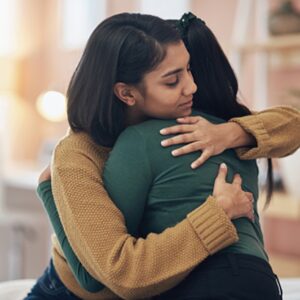 What is the other person going through? Why is the restaurant closed? I wonder about their well-being. If the restaurant is closed, is the owner well or is the staff ok? When I don’t get a return email or phone call, is the recipient doing alright? When the teacher or school nurse calls, I wonder how much stress they are experiencing and what they might be dealing with? I remind myself to err on the side of compassion.
What is the other person going through? Why is the restaurant closed? I wonder about their well-being. If the restaurant is closed, is the owner well or is the staff ok? When I don’t get a return email or phone call, is the recipient doing alright? When the teacher or school nurse calls, I wonder how much stress they are experiencing and what they might be dealing with? I remind myself to err on the side of compassion.
I remind myself that grief and trauma are hard! As we accompany others through their grieving process, we don’t know what their internal struggles are. We are in it together, come what may. In the grieving process we don’t always know what help we need; we don’t always know what to ask for. And when we are experiencing trauma, we can forget to ask others for help. Help and compassion are here for you at the church, in the congregation, and in the community.
 If we are all experiencing grief, loss, and trauma then we can easily forget to ask others for help. It is all too easy to feel frustrations. And if we remember the words of the psalmist, prophet, and disciple we are reminded that God has compassion for us. God is moved to act on our behalf with compassion. We can also be moved by that same compassion towards our neighbors and ourselves. To love because we are first loved is to have compassion because we have received compassion. This community is here for you. Err on the side of compassion with others and yourself also.
If we are all experiencing grief, loss, and trauma then we can easily forget to ask others for help. It is all too easy to feel frustrations. And if we remember the words of the psalmist, prophet, and disciple we are reminded that God has compassion for us. God is moved to act on our behalf with compassion. We can also be moved by that same compassion towards our neighbors and ourselves. To love because we are first loved is to have compassion because we have received compassion. This community is here for you. Err on the side of compassion with others and yourself also.
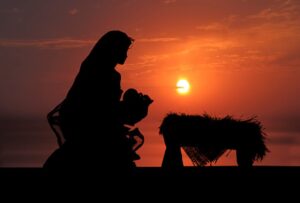
The Christmas Story from the Gospel of Luke
by Racquel Ray, Assoc. Minister (Acting)
In those days a decree went out from Emperor Augustus that all the world should be registered. This was the first registration and was taken while Quirinius was governor of Syria. All went to their own towns to be registered. Joseph also went from the town of Nazareth in Galilee to Judea, to the city of David called Bethlehem, because he was descended from the house and family of David. He went to be registered with Mary, to whom he was engaged and who was expecting a child. While they were there, the time came for her to deliver her child. And she gave birth to her firstborn son and wrapped him in bands of cloth, and laid him in a manger, because there was no place for them in the inn. In that region there were shepherds living in the fields, keeping watch over their flock by night. Then an angel of the Lord stood before them, and the glory of the Lord shone around them, and they were terrified. But the angel said to them, “Do not be afraid; for see–I am bringing you good news of great joy for all the people: to you is born this day in the city of David a Savior, who is the Messiah, the Lord. This will be a sign for you: you will find a child wrapped in bands of cloth and lying in a manger.”
And suddenly there was with the angel a multitude of the heavenly host, praising God and saying, “Glory to God in the highest heaven, and on earth peace among those whom he favors!”
When the angels had left them and gone into heaven, the shepherds said to one another, “Let us go now to Bethlehem and see this thing that has taken place, which the Lord has made known to us.” So they went with haste and found Mary and Joseph, and the child lying in the manger.
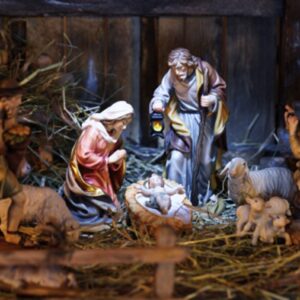 With our lives so complicated in these challenging days, it is SO GOOD to hear these familiar words. The past two years have been full of loss, grief, trauma, and uncertainty. Our healthcare workers are exhausted and depleted in every aspect of human wellness. Teachers and educators have found creative solution to impossible requests. Students have found daily resiliency through the changing modes of academia. First responders have seen more than their share of trauma. We have spent time in isolation from loved ones, distanced but not distant. We have lost too many seniors and WWII Veterans.
With our lives so complicated in these challenging days, it is SO GOOD to hear these familiar words. The past two years have been full of loss, grief, trauma, and uncertainty. Our healthcare workers are exhausted and depleted in every aspect of human wellness. Teachers and educators have found creative solution to impossible requests. Students have found daily resiliency through the changing modes of academia. First responders have seen more than their share of trauma. We have spent time in isolation from loved ones, distanced but not distant. We have lost too many seniors and WWII Veterans.
And, we don’t know what the next year will bring – more of the same? Or, major changes? These are uncertain times indeed.
But. THIS CHRISTMAS, we have each other. We have these familiar words of joy and comfort from Luke’s Christmas Story. We have built a resilient, thriving, and growing church community. We have found innovative ways to minister to each other and care for one another. We have fed the hungry, sheltered the housing insecure, cared for the widow and orphan, and nurtured our young. We have found ways to make meaning and community – as a community. This Christmas, we have the gift of community and two wonderful celebrations of the Christmas Story!
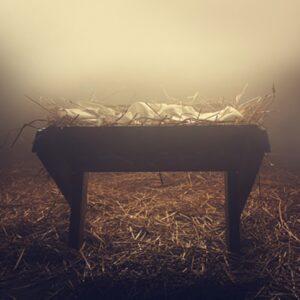 4 – 5 pm Christmas Story Stroll – outdoors, family friendly, accessible, and safe.
4 – 5 pm Christmas Story Stroll – outdoors, family friendly, accessible, and safe.
8 pm Lessons and Carols – in the sanctuary
Let us continue to grow through these challenging days come what may. Honor and grief the challenges we have come through. And celebrate with Joy, THIS CHRISTMAS, the God who broke into the human timeline, joining humanity to heaven, and bringing us the thrill of HOPE.
May God Bless you all – THIS CHRISTMAS.
No Place for Them in the Inn
by Racquel Ray, Assoc. Minister (Acting)
And [Mary] gave birth to her firstborn son and wrapped him in bands of cloth, and laid him in a manger, because there was no place for them in the inn.[1] Mary and Joseph responded to the emperor’s decree. It would make sense then that Bethlehem, its synagogues, and Joseph’s ancestors would be aware of the census and the homecoming of their progeny. Certainly, as Roman Governance knew of the decree and the ordered census; they were aware of the migration of native peoples to their birth places. Why then were there no provisions for shelter for the family; for Joseph and expecting Mary? With the mere statement of ‘because there was no room for them in the inn’ Mary and her family experienced their first taste of rejection from the principalities that ruled the occupied land into which God called them.
The census was ordered by Augustus Caesar when Quirinius was governor and shortly afterwards Tiberius Caesar came to power and Pontius Pilot was governor. In the midst of a Roman Change of Command, the Roman government ordered a census be taken in order to ‘clean up’ the tax rolls. All of the Roman hierarchy, the Jewish hierarchy, and the little town of Bethlehem knowingly neglected to care for the migrating masses; those answering God’s call, those needing shelter, and a young new family.
Mary, like so many women since, felt the same sting and shame of the slammed door and the invitation to perhaps look around back for something less-than; rejection and minimization. How many women have experienced similar offers? And, how often is the ‘Role of Women’ read as a singular rather than the complex, multi-faceted and multi-millennial tapestry woven from Mary to modernity? How many children and marginalized peoples have experienced the same rejection and minimization while being lumped into demographic descriptors? And haven’t we all experienced the same at some point?
When we as a church or as communities close our doors to others, we may not know the full impact of our actions. We may not understand that we have rejected those who were called by God to knock on our door! How do you think the innkeeper felt after the shepherds departed? The story in the Gospel of Luke 2:16-18 says:
So they went with haste and found Mary and Joseph, and the child lying in the manger. When they saw this, they made known what had been told them about this child; and all who heard it were amazed at what the shepherds told them.
Can you imagine the repercussions of closing the door on the Holy Family for the innkeeper? How many people in Bethlehem would have wondered why was the child in the manger? How is it that these masses of Israelite migrants came to Bethlehem to register for the census only to find no housing? In hindsight we may read the actions of the community as a mistake. And yet, God’s will prevailed.
Mary and Joseph were answering God’s call and prophetic word to rear and raise Jesus. They were also obedient to the local laws, decrees, and customs. And, sometimes, listening to God and adherence to the law can put us into challenging circumstances.
Later, when Jesus says the Son of Man has no place to lay his head, he was responding to the disciples’ promise to follow him where he goes.[2] There seems to be a trend in answering God’s call. Answering God’s call often leads us to closed doors, alternative plans, unknowing our own homes. And often in the process we are offered minimization, no room in the inn and no place to rest our head.
 For women in ministry this can be especially challenging. It has been my experience that for some mid-century women our wisdom was discounted as closed mindedness, our experience discounted as personal story, our emotional presence discounted as hysteria, family relationships discounted as obligations. However, as a theologian and as a deeply spiritual person responding to God’s call, ministry, for me, is more about being and becoming who God has created and called me to be and helping others do the same. Though the negative messaging has been very painful to hear, it is not where God has called me or any of us to remain. Theologian Sarah Coakley writes:
For women in ministry this can be especially challenging. It has been my experience that for some mid-century women our wisdom was discounted as closed mindedness, our experience discounted as personal story, our emotional presence discounted as hysteria, family relationships discounted as obligations. However, as a theologian and as a deeply spiritual person responding to God’s call, ministry, for me, is more about being and becoming who God has created and called me to be and helping others do the same. Though the negative messaging has been very painful to hear, it is not where God has called me or any of us to remain. Theologian Sarah Coakley writes:
What follows from theologie totale, contemplation and submission to God of the whole self, is that the silence of contemplation is of particular, sui generis (unique), form: it is not the silence of being silenced. Rather, it is the voluntary silence of attention, transformation, mysterious interconnection, and (in violent, abusive, or oppressive contexts) rightful and divinely empowered resistance: it is a special ‘power-in-vulnerability’…Contemplation engenders courage to give voice, but in a changed, prophetic key.[3]
 We are encouraged, as Mary did, to treasure all these things and ponder them in our hearts. But, to change the dynamics of dialogue from marginalization to prophetic witness. Mary, who later calls her son to public ministry at the wedding in Canna, shifted her silent contemplation to prophetic action. When, in contemplation of our call to ministry to our neighbors, do we open doors or close them? Do we offer hospitality? Do we offer provision? Do we respond to oppressive contexts with love and affirmation for the marginalized? Do we shift our silence to prophetic action?
We are encouraged, as Mary did, to treasure all these things and ponder them in our hearts. But, to change the dynamics of dialogue from marginalization to prophetic witness. Mary, who later calls her son to public ministry at the wedding in Canna, shifted her silent contemplation to prophetic action. When, in contemplation of our call to ministry to our neighbors, do we open doors or close them? Do we offer hospitality? Do we offer provision? Do we respond to oppressive contexts with love and affirmation for the marginalized? Do we shift our silence to prophetic action?
The United Church of Christ is the most attentive and welcoming denomination for women and marginalized peoples. Believing in a ‘still speaking God’ means that we must listen and evolve. It means opening our doors to those who were once marginalized and turned away, shifting the dialogue from silence to action, and offering others a place to rest and minister.
 I am so deeply grateful for the open doors at Barrington Congregational Church! For the hospitality and provision offered by our leadership, staff, deacons, ministry teams, and our congregation! Let us continue to welcome the stranger, offer respite for our ministers, and a church home where we can all rest and renew. There is room at the inn, and I shall treasure these things and ponder them in my heart.
I am so deeply grateful for the open doors at Barrington Congregational Church! For the hospitality and provision offered by our leadership, staff, deacons, ministry teams, and our congregation! Let us continue to welcome the stranger, offer respite for our ministers, and a church home where we can all rest and renew. There is room at the inn, and I shall treasure these things and ponder them in my heart.
[1] (Coogan, Brettler, Newsom, Perkins, 2010) Luke 2:7
[2] (Coogan, Brettler, Newsom, Perkins, 2010) Luke 9:58,57 paraphrased
[3] (Coakley, 2013) p.84-85 with paraphrase
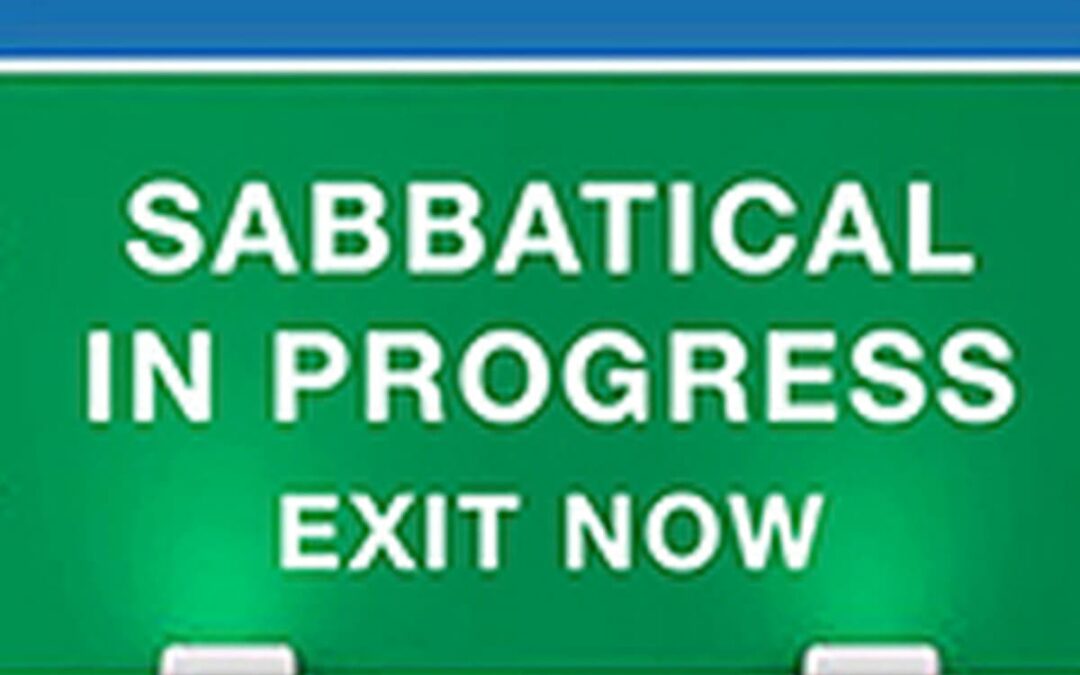
Plans for my sabbatical adventure
by Rev. Dr. Dale Azevedo, Sr. Minister
I am so thankful to the BCCUCC congregation for the opportunity to take a sabbatical this year. It all came about on relatively short notice and has been a bit of a whirlwind getting everything ready (both in the church and personally). Thank you for your support in this endeavor. Below, I lay out some of what I want to accomplish during this time away. I hope you find it informative. When I return, I will be sure to find ways to share some of my experiences and learnings with you all.
Relaxation and Rejuvenation
Part of the focus of a sabbatical leave is rest and relaxation. My call letter specifically states this as one of the primary objectives. I plan to find rejuvenation in three venues: wheeling, travel, and spending time with Elizabeth.
 I shared in my last blog that one of the ways I “fill my bucket” is by taking my Jeep off-road. I am a member of the Baystate Jeepers, which is a Massachusetts-based Jeep club that focuses on off-roading on legal land and following “tread lightly” practices. While my sabbatical is during the off-season, I hope to organize a few ad-hoc rides through New England as well as a weekend trip in Pennsylvania. However, my big excursion will be traveling to the Winter 4×4 Jamboree in Hurricane, Utah. This is a four-day national event for off-road enthusiasts. I’ve never done anything like it and this sabbatical makes it possible. I only hope not to break the Jeep…too much.
I shared in my last blog that one of the ways I “fill my bucket” is by taking my Jeep off-road. I am a member of the Baystate Jeepers, which is a Massachusetts-based Jeep club that focuses on off-roading on legal land and following “tread lightly” practices. While my sabbatical is during the off-season, I hope to organize a few ad-hoc rides through New England as well as a weekend trip in Pennsylvania. However, my big excursion will be traveling to the Winter 4×4 Jamboree in Hurricane, Utah. This is a four-day national event for off-road enthusiasts. I’ve never done anything like it and this sabbatical makes it possible. I only hope not to break the Jeep…too much.
To get the most out of this experience, I will be taking 5-6 days to drive out to Utah and another 5-6 days to return. I see this as a wonderful opportunity to see parts of the country and meet people I otherwise would never have had the chance to. I plan to take a southern route out and a northern route (weather dependent) back. Of course, I hope to do some wheeling in Arkansas and Indiana while I pass through those states!
This brings up the idea of travel. I will be taking this big trip to Utah, but Elizabeth and I hope to also get away too. We aren’t happy flying during COVID times, so we are looking within driving distance. Since I want warm weather and Elizabeth wants to go birding, we are looking at South Carolina. It’s a little bit of a drive, but at least I’ll be spending the time with someone I love, and we will have plenty of time to talk in the car! Life is often so busy it sometimes feels like the week passes and we hardly have quality time to connect with each other. Hopefully, between this trip and the other times during my sabbatical, we will get some real quality time together.
Spiritual Practice
Another important part of a sabbatical is spiritual development. I read the Bible, pray, and talk about God all the time at work. But that often feels like work. Pastors seldom get time to really contemplate their faith and deepen their relationship with God. I hope to do so during these months away.
One thing I’ll do is keep up with my Peaceful Pause & Prayer. Sadly, I won’t be conducting live meditations every Tuesday and Thursday during my sabbatical as I regularly do. But I will keep up the discipline for myself. I have found this time truly rewarding over the past year and plan to keep up the practice while I am away. I may even do it three times a week, including Sunday mornings. And when I return, I wholly expect to invite you all again to join me in this practice.
 This brings me to my next idea, worshipping at the synagogue. A few weeks ago, I reached out to Rabbi Voss-Altman at Temple Habonim and asked if Elizabeth and I would be welcome to worship with them during my time away. He responded saying that they would welcome us with open arms. I am really looking forward to the opportunity to deepen my ties with their membership as we continue to foster the special relationship between our two congregations. Elizabeth and I periodically attended Shabbat services while we were in seminary many years ago and look back on those times fondly. Of course, we’ll need to find somewhere else to go on Christmas Eve!
This brings me to my next idea, worshipping at the synagogue. A few weeks ago, I reached out to Rabbi Voss-Altman at Temple Habonim and asked if Elizabeth and I would be welcome to worship with them during my time away. He responded saying that they would welcome us with open arms. I am really looking forward to the opportunity to deepen my ties with their membership as we continue to foster the special relationship between our two congregations. Elizabeth and I periodically attended Shabbat services while we were in seminary many years ago and look back on those times fondly. Of course, we’ll need to find somewhere else to go on Christmas Eve!
Finally, I look forward to engaging in a practice of daily journaling. Some pastors take their sabbatical intending to start a particular focus of study or personal learning that will enhance their spiritual life or congregational leadership. I am choosing a different path. I am not entering this time with the expectation to learn something specific or grow in a particular way. I do, however, expect to grow and change while on my sabbatical. I am entering this time being more open to how God will work in me and through me. To facilitate and chronical this growth, I plan on journaling at the end of every day. Journaling has always been one of the most effective connections with God that I have had, and I anticipate that this special time will be no different.
Creative Pursuits
The final focus of my sabbatical is to take time to be creative. There is something special, even mystical, that comes over us as we create. I think this has to do with the connection it develops with the Great Creator (that’s God, by the way). There are two pursuits I am contemplating.
 During the summer of 2020 I took a course on storytelling and publishing. I took three weeks’ vacation that summer which coincided with the course I enrolled in and started writing a book. It was a fictional adventure. I really liked what I produced, but quickly realized that I had only written the first act of what would end up being a five-act story. When September came around, I had to set it aside, as church became just too busy. Lately, I have been motivated to resume that writing. The one thing holding me back is that I know three months isn’t enough to complete the work. I’d still have a third of it, at least, to go. I’ll have to see how this plays out.
During the summer of 2020 I took a course on storytelling and publishing. I took three weeks’ vacation that summer which coincided with the course I enrolled in and started writing a book. It was a fictional adventure. I really liked what I produced, but quickly realized that I had only written the first act of what would end up being a five-act story. When September came around, I had to set it aside, as church became just too busy. Lately, I have been motivated to resume that writing. The one thing holding me back is that I know three months isn’t enough to complete the work. I’d still have a third of it, at least, to go. I’ll have to see how this plays out.
The other option is woodworking. I have long been a woodworker and REALLY enjoy creating with my hands. There is something special about taking a pile of lumber, working with it, and leaving behind a cabinet, dresser, or some other piece of furniture. It’s been a long time since I crafted a large piece of furniture or other project. Doing this would be extremely rewarding…and reminds me of another carpenter we often talk about.
Well, writing all this down makes me question how much of this will really get accomplished! I look forward to the experience, my first sabbatical in 26+ years of ministry, and also sharing the results with you when I return. BCCUCC is a special and blessed church community. I feel blessed to be called to be your Sr. Minister and for our shared ministry. Please think of me often and include me in your prayers over the next three months. I will certainly be keeping you all in mine.

Children in the Church
By Racquel Ray, Assoc. Minister (Acting)
Children’s presence in the community has been acknowledged from Jesus to today. However, at times, the church failed to recognize the importance and contributions of children in its mission. Here at Barrington Congregational Church United Church of Christ, our young folks are integral members of the community. This is in keeping with the Gospel message.
Children have been integral and contributing members of the church from Jesus’ Incarnation through the child Mary, the crowds that followed Jesus numbering thousands of men plus women and children, and our current dynamically multi-generational church Body. Children are woven into the fabric of our communities whether neighborhoods, schools or churches. As promised through the Baptismal Covenant the church has received children into the body of Christ. Children are not the future of the church. They are the NOW of the church; full and present members of the Body of Christ. The church has a unique obligation to children; to acknowledge, accept and accompany young people (and their parents).
Scriptures illustrate through Mary, the crowds, and the boy with fish and loaves in the Gospel of John (1) that children have played an integral role in the life of Jesus and His ministry. Jesus often used children to illustrate his parables teaching adults to be childlike. In the Gospel of Luke children were brought to Jesus, “even infants, that he might touch them.”(2) Matthew’s Gospel shows that children were brought to Jesus so that He “might lay his hands on them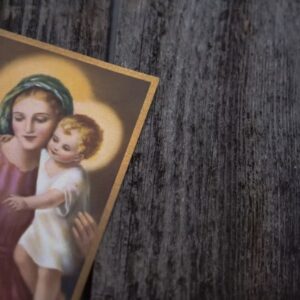 and pray.” (3) Mary, the theotokos, the Godbearer, was young – probably thirteen or fourteen.(4) Authors Kendra Creasy Dean and Ron Foster write of Mary:
and pray.” (3) Mary, the theotokos, the Godbearer, was young – probably thirteen or fourteen.(4) Authors Kendra Creasy Dean and Ron Foster write of Mary:
Although a teenager, Mary need not “find” her ‘self’. Her identity is a gift, bestowed upon her by God alone. Who am I? Mary may wonder. And God replies, “You are my favored one, beloved and beautiful to me.”(5)
The feeding of the crowds of five thousand in the Gospels of Matthew, Mark, Luke and John; and the feeding of the crowds of four thousand in Matthew and Mark indicate the crowds were comprised of men plus women and children. The Johannine narrative explicitly tells of the importance and contribution made by children:
When [Jesus] looked up and saw a large crowd coming toward him, Jesus said to Philip, “Where are we to buy bread for these people to eat?”…There is a boy here who has five barley loaves and two fish…Then Jesus took the loaves, and when he had given thanks, he distributed them to those where were seated; so also the fish, as much as they wanted. (6)
Clearly, children were implicitly present in Jesus’ ministry as part of the crowd that followed Jesus; crowds and congregations are comprised of people – including  children. Children were also explicitly contributing members of Jesus’ ministry; Mary the Godbearer and the Boy with loaves and fishes the founder of the feast for five thousand. Children’s spirituality in the Gospel narratives simply reflects young people being who God created them to be, having spiritual agency and ministering to the Body of Christ. The role of the church, the community and our ministers is to likewise acknowledge, accept and accompany young people as Jesus did. Jesus accompanied children accepting them as divine creatures. And so must we.
children. Children were also explicitly contributing members of Jesus’ ministry; Mary the Godbearer and the Boy with loaves and fishes the founder of the feast for five thousand. Children’s spirituality in the Gospel narratives simply reflects young people being who God created them to be, having spiritual agency and ministering to the Body of Christ. The role of the church, the community and our ministers is to likewise acknowledge, accept and accompany young people as Jesus did. Jesus accompanied children accepting them as divine creatures. And so must we.
Over the last three days (as of this writing) the BCCUCC campus has been joyfully full of sparkling squeals of our youngest members. Last Saturday’s Pumpkin Palooza brought families and friends together, in-person, outdoors for the first time in over a year. Sunday after our worship service families migrated to the playground as kids played and parents reconnected. On Monday night, families gathered on the terrace for campfire and community around our youth.
The Faith Formation and Youth Ministry team (FFAYM) is an enthusiastic and energetic bunch of ministers, especially our Faith Formation Director Andrea Terni Bullard. This devoted group met a few weeks ago to brainstorm fall and winter programming, including support for families and youth. And this is the work of the Gospel; finding creative, relevant, and impactful ways to centralize our youngest members.
As our program year progresses and we approach Advent in a few short weeks I would like to commend our FFAYM programs to your attention. As our children and youth are vital to our community, we need your support in our Church School and Youth Ministry efforts. Classroom teachers are needed on Sunday mornings. Adult chaperones are needed for weekly and monthly Youth Group meetings. Please prayerfully consider whether God is nudging you to help out? Your ministry on behalf of our younger members will be a great gift to our church!
1 (Coogan, Brettler, Newsom, Perkins, 2010) John 6:9
2 (Coogan, Brettler, Newsom, Perkins, 2010)Luke 18:15
3 (Coogan, Brettler, Newsom, Perkins, 2010)Matthew 19:13
4 (Kenda Creasy Dean, 1998 )p.46
5 (Kenda Creasy Dean, 1998) p.46
6 (Coogan, Brettler, Newsom, Perkins, 2010) John 6:5-11 paraphrased

Where do you find your strength?
by Rev. Dr. Dale Azevedo, Sr. Minister
I lift up my eyes to the hills—
from where will my help come?
My help comes from the Lord,
who made heaven and earth.
(Psalm 121:1-2)
Where do you find your strength? We each find ourselves in moments of tiredness and exhaustion. Times when we feel overwhelmed or under-able. Where is it that you turn during those times to find your strength? Your ability to carry on? Your capacity to try one more time? Or why is it that you get up each morning and work your way through another day? As someone said to me last week, “Life isn’t easy.”
There are many areas that we can turn to to find our strength, our energy. Some people find it in their children. I’ve known people whose deep love for their children was what sustained them through all their hardships. They knew that everything they endured made their children’s lives better. So they persevered. Some people find strength in goals and achievements. Have you ever known  someone who was driven to succeed, or earn a particular living or lifestyle, and that goal buoys them through the tough times? Others find strength in groups and just being around other people. These people are our extroverts. Just being with other people feeds them energy. Of course, being the introvert I am, I sometimes feel like it is my energy off of which they are feeding!
someone who was driven to succeed, or earn a particular living or lifestyle, and that goal buoys them through the tough times? Others find strength in groups and just being around other people. These people are our extroverts. Just being with other people feeds them energy. Of course, being the introvert I am, I sometimes feel like it is my energy off of which they are feeding!
Another way of looking at this is by asking another question: What fills your bucket?
This is what Elizabeth and I have been talking about lately: what fills each of our buckets? For Elizabeth, one of her sure-fire ways to get her bucket filled is to spend time outside in nature. Going for a walk or hike, seeing birds or other animals, breathing the fresh air. It all helps her feel alive and full of energy. Drawing and being creative also fills her bucket. My nourishing activities are a bit different. I like being creative too, but for me it is often in building or repairing something, completing a project that used my mental and physical  skills. Also being out in nature feeds me, but I like doing it in my Jeep, challenging myself and my vehicle to make it through or over obstacles (hopefully without breaking anything!). Lately, we’ve been trying to spend more time intentionally filling our buckets than we have in the past. It’s an intentional part of our goal to make it through the pandemic as best as we can.
skills. Also being out in nature feeds me, but I like doing it in my Jeep, challenging myself and my vehicle to make it through or over obstacles (hopefully without breaking anything!). Lately, we’ve been trying to spend more time intentionally filling our buckets than we have in the past. It’s an intentional part of our goal to make it through the pandemic as best as we can.
Now, I haven’t mentioned faith or church yet. I’d be deeply remiss if I didn’t speak on how faith and church are a powerful source of faith for so many people. That’s probably a reason many of you joined the church to begin with. Something about it fills your bucket, feeds you, and gives you strength! I guess you could be attending solely out of guilt, but that’s not the best reason to participate. Being fed and feeding others are much healthier reasons to be a part of a faith community.
I started this blog off with the scripture verse from Psalm 121. For many people reading the Bible is a great source of strength. As is personal prayer. For me, worship is a great way to be energized and find the stamina to make it through another week. I have really been energized since so many of us returned to in-person worship in September. Of course, being a pastor and leading worship is also very draining. I hear about lots of clergy who nap every Sunday afternoon to recover from the strain of the morning. I get that! But it also fills me up. Being a part of the community, seeing you all, and sharing in common mission is a powerful force.
Sunday afternoon to recover from the strain of the morning. I get that! But it also fills me up. Being a part of the community, seeing you all, and sharing in common mission is a powerful force.
There is a scripture lesson that I read occasionally at funerals. It is taken from the 40th chapter of Isaiah. It goes, “Even youths will faint and be weary and the young will fall exhausted, but those who wait for the Lord will renew their strength, they shall mount up with wings like eagles, they shall run and not be weary.” I love that passage, for it gives me hope that even when I am fatigued and struggling God will provide.
How about you? Where do you turn for strength? What fills your bucket. I’m sure you get weary and exhausted. We all do, especially with all the changes we’ve been through over the past few years. And life is hard. But there are countless founts of strength and hope around you. Which feed you? Which lift you up? And how can you make the time you need to experience them? Make the effort, and feel the reward.
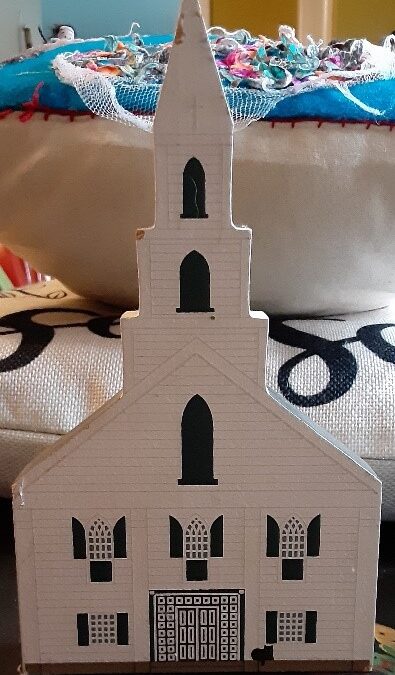
Welcome Home
by Racquel Ray, Acting Assoc. Minister
Welcome Home.
About twenty-five years ago when I began ministry, a family member sent me this wooden church as a Christmas present along with a replica of the Barrington Town Hall. I have since added to my collection with a House of the Seven Gables and a replica of the home of Elizabeth Winslow in Salem, MA. At the time my husband and I were in the United States Air Force and we were stationed in Mountain Home Idaho. These miniature wooden block buildings reminded me of my home and deep New England roots.
Elizabeth Winslow was a daughter of Governor Edward Winslow of Pilgrim history and inheritor of what is now know as “Witch House” in Salem. The house she inherited was that of her late husband George Corwin, stepson Judge Jonathan Corwin, and step-grandson Sheriff George Corwin of Salem historical fame.
These decorations have been on the shelves of three homes and have traveled across the country with our family as we returned to my roots here in Rhode Island. It wasn’t until I was wandering around the house and praying about what things might I need in my new office at Barrington Congregational Church United Church of Christ did I notice that these objects were prophetic.
As you know from my announcement profile, I have a long history of ministry in the Episcopal church. I am a fairly recent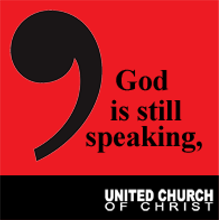 convert to the United Church of Christ. When these wooden blocks were gifted to me, I had no idea where God would lead me decades later. But, it was in these decades when I learned what makes me come alive; what makes me unique, what I am most passionate about, what my gifts and talents are, what my limitations are, how to listen to God’s call and respond to it, and how to respond to the needs of others.
convert to the United Church of Christ. When these wooden blocks were gifted to me, I had no idea where God would lead me decades later. But, it was in these decades when I learned what makes me come alive; what makes me unique, what I am most passionate about, what my gifts and talents are, what my limitations are, how to listen to God’s call and respond to it, and how to respond to the needs of others.
One of the most powerful aspects of the United Church of Christ that drew me toward this denomination was the openness to listen to a ‘Still Speaking God’. The theology of listening to God resonates with me personally; that still small voice, the message in silence, the change of heart through listening to others, formation and re-formation through experiential learning, co-creative and innovative ministries, NEW ideas, and daily renewal and revival. I see the beauty of creation and life all around us as God is still speaking. And we are direct beneficiaries of that daily gift. And even sometimes God calls us into something new.
Author Parker Palmer writes in Let Your Life Speak, Listening for the Voice of Vocation (Palmer, 2000) that the signs of our life’s vocational calling, the work that God has uniquely designed each of us to do, are sprinkled throughout our life’s 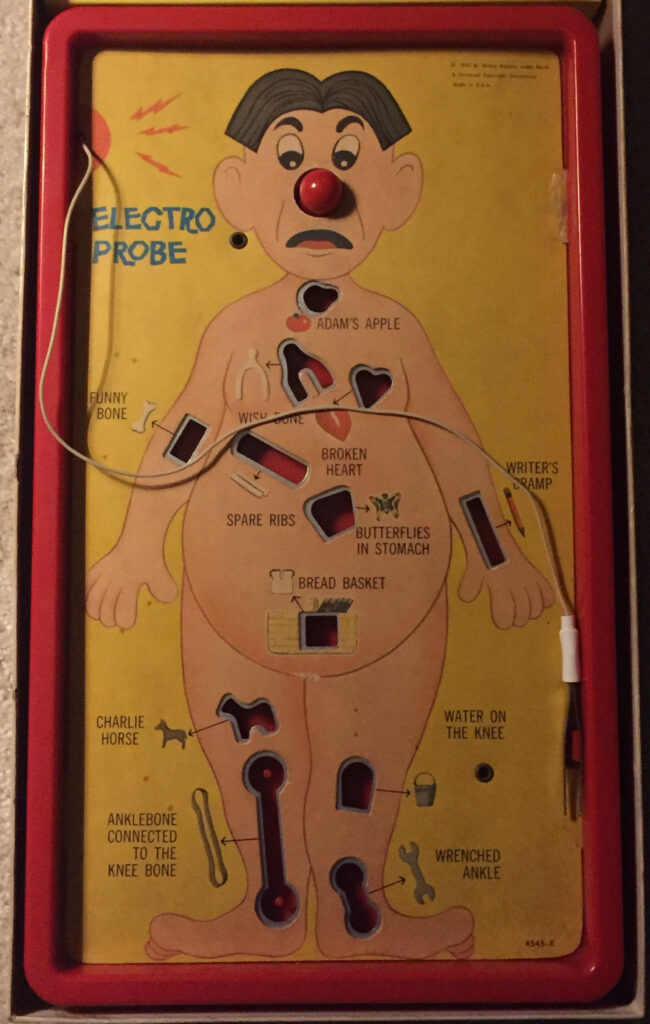 experiences. When we look back at our lives we can reflect on experiences that were foretelling of what God may have for each of us to do. Many of my seminary friends shared stories of lining up their stuffed animals as kids and serving make believe Communion to their teddy bear friends. How many teachers spent childhood afternoons playing school? How many doctors started with the Operation game? Was it music and pretending you were on stage? Did anyone love to play office using the stapler, tape, glue, hole punch, sticky notes, markers, pens, and (my personal favorite) the rubber stamps and stamp pads with PAID or PAST DUE or the rotating DATE option? Those moments in our lives that can leave visceral and happy memories can be moments that lead to our life’s purpose.
experiences. When we look back at our lives we can reflect on experiences that were foretelling of what God may have for each of us to do. Many of my seminary friends shared stories of lining up their stuffed animals as kids and serving make believe Communion to their teddy bear friends. How many teachers spent childhood afternoons playing school? How many doctors started with the Operation game? Was it music and pretending you were on stage? Did anyone love to play office using the stapler, tape, glue, hole punch, sticky notes, markers, pens, and (my personal favorite) the rubber stamps and stamp pads with PAID or PAST DUE or the rotating DATE option? Those moments in our lives that can leave visceral and happy memories can be moments that lead to our life’s purpose.
As I was gathering books from my library and objects to enrich my church office, I was reminded of the journey to this call. The Congregational church that has been sitting on my shelf for two and a half decades was not a decoration but a prophetic foretelling of where God would one day send me. A library full of books on guiding congregations through trauma, leading Youth Ministry, healing, preaching, history of New England, self-care, leading worship and liturgy, and a full theological library and commentary library are not  reflections of my history but a view into my future.
reflections of my history but a view into my future.
Our challenge and call as a community is to discern how we join our futures together. How can I help you? What books are on YOUR bookshelf? What games did you love to play in your youth? What courses spoke most deeply to you in schools? When or where are you happiest? What is your passion? What is your dream? What makes you come alive? And how can I help you use your God gifted passions to grow your community?
Howard Thurman theologian, activist, and visionary said, “Don’t ask yourself what the world needs. Ask yourself what makes you come alive, and go do that, because what the world needs is people who have come alive.”

I Wish I Knew
by Rev. Dr. Dale Azevedo, Sr. Minister
That’s the answer.
I wish I knew.
The question is, “What’s this up-and-coming year going to be like?”
As your church staff and lay leaders have been hard at work over the past month preparing for the start of a new program year at BCCUCC, we’ve all been wondering this. No one (that I know of, at least) expected the pandemic to carry on “from a few weeks to a few months,” to “six months to a year,” to where we find ourselves now. The ongoing delta variant certainly threw things into a bit of chaos. Last spring we were planning on having all restrictions gradually removed through the summer and a return to more typical reality by this point. Sadly, that hasn’t been the case.
Fortunately, Rhode Island has not seen the tremendous upswing in cases and hospitalizations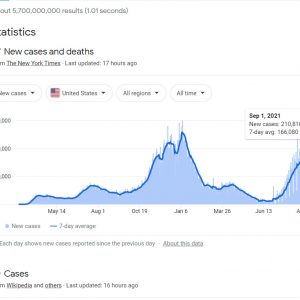 that many areas around the country have seen. Yesterday, there were nearly 211,000 new cases across the country with over 1900 deaths. Those numbers is being repeated every day and they are still climbing! Again, we are fortunate that Rhode Island is on the better side of those numbers, thanks to our proactive guidelines.
that many areas around the country have seen. Yesterday, there were nearly 211,000 new cases across the country with over 1900 deaths. Those numbers is being repeated every day and they are still climbing! Again, we are fortunate that Rhode Island is on the better side of those numbers, thanks to our proactive guidelines.
But this still leaves the question as to what church will be like as the pandemic continues to ebb and flow. We are opening up so many of our ministries and seeking to return to being the active community of faith we have always been. Yet as we do this, we are enacting new guidelines to keep us (and our communities) safe. This remains difficult for everyone.
I have recently heard of some folks who are choosing to stay home because they find wearing masks uncomfortable or problematic. Meanwhile, others are choosing to stay home because they are not yet comfortable being in large groups and confined spaces with those they don’t know well. This adds to the uncertainty about what church will be like over this coming year. Not only do we have a still-shifting health landscape to cope with, but we have so many different ideas on how we should handle it and what each of us are comfortable with.
I support each of you as you make the necessary decisions to for your own comfort and family safety. Saying that, I also ask you to respect the church’s  decisions regarding mask wearing and other COVID precautions. These are difficult decisions, and your elected lay leaders (all volunteers) are putting in a lot of time, prayer, and energy into every decision they make.
decisions regarding mask wearing and other COVID precautions. These are difficult decisions, and your elected lay leaders (all volunteers) are putting in a lot of time, prayer, and energy into every decision they make.
I started off by stating, “I wish I knew”. I’m sure most of us do. A lot of us are tired of living with the unknowns and the shifting sands of pandemic life. It is tiring and draining on us all. Yet, it is also an adventure, a journey. It is life. We don’t ever know what it going to happen to us from one day to the next, from one moment to the next. We often (during non-pandemic times) slip into a regular pattern of assuming things will continue as we expect and that we can make plans and carry them out. But as we all know, that does not always work out the way we intend. God, or life, has a way jerking us back to the reality of the unknown. To remind us that we cannot take today, even with all it’s problems, for granted. We need to embrace it and celebrate it while we can.
This brings me back to this up-and-coming year. We have so many activities planned, so many hopes and expectations. We don’t know if you will be coming along and joining us or not. We don’t know if come Open Doors Sunday on September 12, we will have full church or if many people will continue to choose to worship online. All we can do is prepare, open our doors,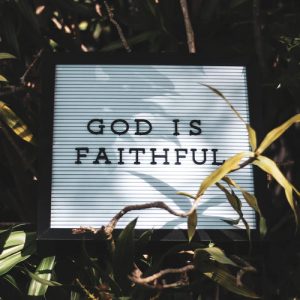 and say, “Welcome!”
and say, “Welcome!”
I encourage you to come back to church. Whether for you that means being here in person or attending online is up to you. I encourage you to participate in our children’s programs, adult education programs, fellowship opportunities, and community outreach. I have no idea how they will shift or change through the year, but I hope you will join me in participating in person or virtually as you are able.
One thing I do know, God isn’t through with us yet. God is working in and through each of us and our church. And God will be with us through this coming year. Let’s hold onto that and onto our love for each other and our church. Amen!

Inscribed on the Palms of God’s Hands
by Rev. Dr. Linda Hartley, Assoc. Minister
It’s hard to believe, but this will be my last blog for the Barrington Congregational Church. I had never written blogs before. And in fact, when asked during interviews with churches if I would be blogging, my usual response was “No, I don’t think I’ll be doing that.” However, as the saying goes – “Never say ‘never.’” During the pandemic this past year, I’ve appreciated the opportunity to connect with you through my monthly blog. I’ve especially appreciated this forum as a means of offering support and hope, with a little bit of laughter sprinkled in for good measure.
As I thought about what I would write as I close out my time here at Barrington, I came back to one of my favorite Bible verses from the Prophet Isaiah. In the following verse, the prophet we know as Second Isaiah is speaking God’s word to the people of Israel who are still living in exile in Babylon. They are feeling abandoned, wondering if God has somehow forgotten them and their plight. In response to this, God offers the following reassurance, “Can a woman forget her nursing child, or show no compassion to the child of her womb? Even these may forget, yet I will not forget you. See, I have inscribed you on the palms of my hands.” (Isaiah 49:15-16a NRSV)
Why this Bible verse for my last blog? Well, as I am leaving I am encountering questions about remembering my time here, remembering all of you and what we have shared this past year and a half. If we are of a certain age, we’re aware that memories sometimes fade over time. Memories can also shift a little – we may remember things slightly differently than they actually occurred. In her later years, my mother recalled fondly the many times we would sit and knit together in the evenings. I always found this rather amusing because I only knitted for a short time when I was about nine and taking knitting classes (at her behest) at Sears. As the piece I was knitting began to grow, and I realized that if I finished it I would have to wear the Kermit green sweater I was making, I quickly lost interest and never picked it up again!
Unlike our own memories, which may shift or fade, God assures the people (and us) that God’s memory of us is unfailing. After all, we are “inscribed on the palms of God’s hands.” How much closer could we be to God! Not only are we inscribed there for God to see always, but we are held there as well. When you think about all the ways we show how much we care for each other, it’s often through our hands – holding hands, hugging with our arms and hands, waving  hello and goodbye, kneading dough, making nourishing food. Of course, these are only a few examples. You can probably come up with many more ideas about how you use your hands to show others how much you care.
hello and goodbye, kneading dough, making nourishing food. Of course, these are only a few examples. You can probably come up with many more ideas about how you use your hands to show others how much you care.
I must admit that I hadn’t thought so deeply about this until I was looking for pictures for this blog. As some of you may have realized, I gather the photos from Unsplash.com, which has a plethora of images of just about everything imaginable. For this blog, I simply put “hands” into the search tool and an abundance of images came up. As I was browsing those, I was struck by what our hands reveal about ourselves – hands calloused by hard work, hands wrinkled by age and experience, big hands gently holding little hands, and hands stretched out or clasped in prayer. Some of these images are included in this blog, but there are many more, and if you are so inclined, I invite you to check them out.
Searching through the variety of photos made me even more aware of why God chose this image to reassure the people of Israel. Using the image of hands is a tangible way of communicating how God cares for us. In the tender ways we reach out to each other, we can see God’s tender love for us. In the  callouses of hands roughed up by years of hard work, we can see God’s continuous care and efforts for us. In the lines etched on each palm, we can see our very names and lives etched on God’s own palms, held out for us to see and believe. It is this last one that reassures me that each one of us is known and remembered by the One who truly matters.
callouses of hands roughed up by years of hard work, we can see God’s continuous care and efforts for us. In the lines etched on each palm, we can see our very names and lives etched on God’s own palms, held out for us to see and believe. It is this last one that reassures me that each one of us is known and remembered by the One who truly matters.
It also reassures me that all the experiences we have shared during my time here at Barrington can never be lost for they have become a part of me and part of what I will take with me into my next ministry. God, who holds our very lives, keeps those memories for us and tenderly calls us to remember the very best parts of our shared experiences that these may help us grow more fully into the people God knows us to be. Because of this, we can look forward with hope and optimism to what is to come.

If the way be clear…
by Rev. Dr. Dale Azevedo, Sr. Minister
Last week I was sitting in a meeting with various leaders in Barrington discussing this year’s upcoming Barrington Day of Caring. (It’s going to be held on October 11th, by the way.) Like everyone else these days, we were discussing how to manage the Day of Caring during the pandemic, especially taking into account the rise of the Delta variant. The first question was, “Are we going to hold it?” quickly followed by “How are we going to hold it in a way that is safe for everyone?” As is common these days, the conversation bogged down with all the unknowns. Will there be vaccines for our kids who participate? Will things start to shut down again if the delta variant continues to surge? Can we make plans at this time without knowing what things will be like 10 weeks from now? We all felt we wanted to move forward with the day and that we needed to begin planning now, we just weren’t sure how to proceed. That’s when Patrick spoke up.
For those who don’t know, Patrick Knotley is the pastor at Barrington Presbyterian Church and serves with me on the Barrington Day of Caring board. He said, “We have this saying in the Presbyterian Church, ‘If the way be clear.’ Generally it means that we will do our best to make our plans assuming that we are doing God’s will. And if the way ends up working out the way we planned, great. If not, clearly we were on the wrong path and we make adjustments as necessary.”
God’s will. And if the way ends up working out the way we planned, great. If not, clearly we were on the wrong path and we make adjustments as necessary.”
I was struck by this saying and mindset. It is so easy to get bogged down and caught up in all the “what ifs” and “unknowns” that we can keep waiting and never do anything. I can’t begin to tell you the number of times over the last 18 months that I’ve said, “Well, when we meet again in two weeks [or next month] we’ll know a lot more than we do now.” Invariably, that hasn’t been the case. With each new understanding we’ve gained, new questions and unknowns have arisen. I also can’t tell you the number of times I have thought to myself, “Well, by [insert date here] things will look a lot more normal than they do now.” This just hasn’t been the case! It feels like the goalposts are always moving.
I share all this because it is fall planning time. Late July and August is when we, as the staff, begin to make a lot of concrete plans for the coming year. Our official start date, Open Doors Sunday, is only five weeks away! Will we be singing still? Will we need to wear masks? Will our children be vaccinated? Will we have a choir? How many people will choose to attend worship in person vs. virtually? Will we have church school? A nursery? Will parents want to leave their children? Will the  education building be open? What cleaning protocols will need to be in place in each of our buildings? Will committees want to meet in person and can we host them in the education building in safe way? What will the added expenses of all the protocols be?
education building be open? What cleaning protocols will need to be in place in each of our buildings? Will committees want to meet in person and can we host them in the education building in safe way? What will the added expenses of all the protocols be?
The questions go on and on.
This is why Patrick’s statement touched me. We don’t know all the questions or have all the answers. We can only do the best we can do and see “if the way be clear.” Later today the Moving Forward Team is meeting for the first time since early summer. I have no idea what recommendations they will make regarding our fall planning. Once they make their recommendations, I have no idea what the Church Council will decide on how we ought to proceed. But we will do our best. We will set up guidelines and recommendations that are as consistent with the CDC and Rhode Island Department of Health as we can at this time and then see how things pan out. Everything we do and every decision we have made over the past 18 months has been like playing with a moving target. We make our best decisions and then hope that they are consistent with God’s will and the realities that arise.
So what does all this mean? Make plans. Set goals. Begin to lay foundations for what your ministry will look like in the coming year. The church staff and other lay leaders will also be doing the same. But hold onto them loosely being prepared to adjust and shift as God’s word, the pandemic, and world around us becomes more clear. In the end, it will all work out. Blessings to you and may God bless our ministry together.


